#it's like a cat arbitrarily choosing to acknowledge you
Explore tagged Tumblr posts
Photo


he would go to the ends of the earth to make you smile, and when you do, the world is right.
han - @mochidoodle yakaze - @ukitakejuushiro
#I'm really emotional over two ossans#GET! YOU! A BROTHER! LIKE! THAT!#sorry but when han chooses you#it's like a cat arbitrarily choosing to acknowledge you#you are the Chosen One#and from thence onward you are THE CHOSEN ONE#i love them#send help#houseki#wakamori yakaze#hanzhen cheng li#hanyaka#hhHHhhHHHHHH#I'M SO EMO!!!!!#Mochi doodles
20 notes
·
View notes
Text
Honestly remember season 1 and Maxwell Lord was taken into the DEO without due process and that's when James was like hey maybe the DEO actually isn't good. At all. And he was right but at the time he was only talking about humans at the time, and how they were treating humans. But what if this led his season 2 arc, with him as the head of this massive media company was James realizing that the DEO is actually alien Guantanamo.
These aliens had at minimum 24 years of being locked up, since that was how long Kara was in The Phantom Zone. We have no idea how long they were sentenced there for, or even for what. And what we know is that the DEO would then capture the alien, take them in, and decide whether or not they will be locked up forever and probably horrible confinement with no sunlight, or cell mates, or any chance of parole. Just look at that tiny cell Astra had. There is no parole, they are there forever without any kind of due process or rights, with agents possibly also conducting experiments on them, like they did with Astra and Kryptonite. They literally tortured Astra--and have you ever seen an alien prisoner with a lawyer? I haven't.
Jonn had to pretend to be Hank for over a decade--Hank, who clearly had a bunch of friends in the military as we see in that ep where Alex is interrogated by Lucy in s1. You can't all of a sudden be an alien lover and have extremely Progressive views. Maybe he can gradually and arbitrarily make changes, like letting go of the professor of astronomy that we see, who Hank probably would have kept imprisoned, or doing his best to recruit people who aren't all hardcore xenophobes. But it's not enough.
The DEO literally play judge, jury, and executioner with alien lives.
am not exaggerating when I say this is alien Guantanamo
and James realizing this, especially realizing this when he remembers that they shot Kara out of the sky with Kryptonite and locked her up before letting her go. It's almost a survival thing for Kara to work with them, because this could be her. And it's one thing when it is all the Fort Rozz aliens trying to kill her, but what about all the other aliens in national city?
And do you know who's also end up being on his side? Someone he talks to as a point to be like yes this is the alternative we need, James isn’t just going to be like “this is wrong,” oh no, he’s going to have a solution and ideas of how to make the system better, an alternate especially since right now it seems like for any crime aliens get life sentences. Who this would bring him into contact with? Detective Maggie Sawyer from National City Police Department's science branch. And oh look. Now we also have a cohesive storyline for Maggie that exists outside of Alex.
And that's definitely one way to cause conflict between James and Kara, temporarily breaking them up. Because yes Alex definitely took the job in case they ever came after Kara--she straight out says multiple times she did this to protect Kara, because as she was before she couldn't take on the DEO, and this would give her hours, maybe days of warning that she might need to grab Kara and run-- but it was also a Lifeline when she was struggling. and there's also a fact that most of the aliens Alex encounters wouldn't hesitate to try and kill Aluras daughter if they knew about her, and she says in season one that J'onn told her that they were going to save the world. She then makes a point that she can't distinguish between aliens and humans anymore, but we don't really see that in DEO policies, other than they'll now take in humans with powers as well as aliens. To do what she does, Alex needs to believe that she's in the right-- and tbh it kind of reminds me about border patrol dynamics w their family members(when I went to El Paso,TX--and this is from both undocumented immigrants and the border patrol themselves--they mentioned that several border patrol agents would have family members who were there illegally and it's just the dynamic they live with it's definitely an interesting but complicated topic).
This entire media war would definitely place James at odds with Alex. And even if Kara understands (even if it's a truth Kara doesn't want to acknowledge because so much of her life is hard and complicated and she doesn't want to think about how tenuous her freedom really is, and what she's maybe done for the past year), both Kara and Alex choose each other first, always. It's not a man (or racism) who breaks up Kara and James. And James understands, he does, and he hopes that one day maybe Kara will stop being scared of what could happen (and if she is, its because hes helped shape a world where she wont be)--but it's not going to stop him.
This is what's right. This isn't bs contrived drama--god, the metaphor and symbolism alone, about a black man being in control of the media narrative of the xenophobic practices of shady government law enforcement that do what they want to a vulnerable minority population, shaping public opinion, acting as the moral compass of the show? Mindblowing
This is how James Olsen can end up being a guardian for others. Not with his fists, or against muggers. Because this is something he can do that Kara can't. Kara may be a reporter, can go against a thousand corrupt politicians and institutions potentially--but not the DEO. She can't do this--as an alien, she's under their purview. But James, as a civilian and a human, isn't. Kara Danvers may be somewhat of a big name for a few select journalism circles by being Cat's assistant for 3 years but that’s a selective circle (and how many nights do you think Kara stays up late, trying to avoid thinking about what scenario would make the DEO come after her, or how many times they almost did, how much information they collected on her, before she ever became Supergirl) James said it himself--he took that picture, and now everyone knows his name.
This is not about punches and fighting--this is how James can frame the narrative to shape public opinion and make change on a global scale. He's not some random reporter the DEO can disappear, or intimidate into compliance. He just became the head of an international media company, and he’s publicly known as Superman’s best friend--this has nothing to do with Superman, but he, with all his fragile humanity, has been threatened and intimidated by every single goddamn villain Superman has gone against and came out the other side breathing. Sure he’s scared, but when has that ever stopped him?
He’s James fucking Olsen, and he’ll hold his head high as he does what’s right.
631 notes
·
View notes
Text
Facing Our Making Part 4: Makeup and Performance
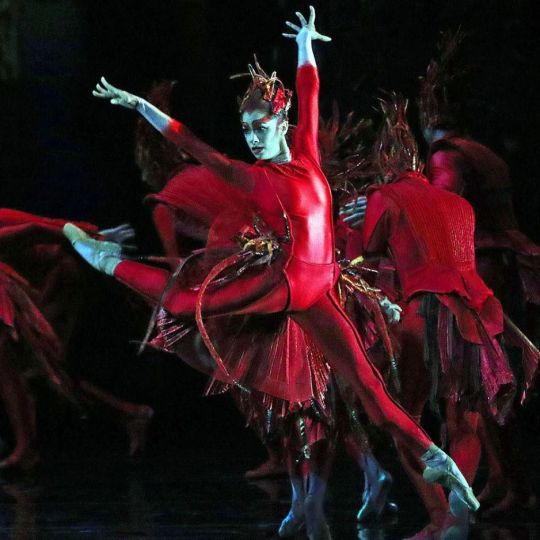
Misty Copeland as “Firebird”
Welcome to the grand finale of the makeup blog series! It’s been a great experience writing about all of this because it’s given me an incredible opportunity to really dig into myself to discover my own biases, blind spots, preferences, and ways I can learn and grow. I dunno about you, but I rather enjoy that shit. I hope that maybe you learned something, too, or at least had a chance to tease out and reflect on how the subject has affected you in your own life.
Getting into social customs and how we each feel about them is an interesting sport. For me, I liken it to when you get your blood pressure measured at the doctor’s office.
You put the arm cuff on,
“Okay, here’s this social topic”
and they put the stethoscope on you to hear your pulse,
“Hello, world. Here’s what I think…”
and then they start pumping and tightening the cuff.
“This is wrong! Here are some arbitrary rules! Less of those people! Restrict! Cancel! Humiliate! Isolate! Deprive! No! Wrong wrong wrong wrong wrong!”
They go until they can’t tighten anymore, and pause.
“Yes, I’ve arrived. This is the TRUTH.”
And then release.
“Actually, fuck it, let people live their lives”
Whooooooosh!
Leaving you with the sound and feel of your own beating heart, the pulsing of the blood as it rushes back in.
“Hello, life.”

(Sorry, I think the sexy blood pressure pout is goddamn hilarious. )
We can do a review of previous blogs in this series, but ultimately what I hope you’ll walk away with is this:
Let’s stop arbitrarily restricting people, whether directly or through complicity, and let them live their best lives.
Yes, we need to examine social and structural cancers. But no, a boy with a purse and an 80 year old woman in sequins snake-print pants are most certainly not that.
I want to write about makeup and ageism. I want to write about makeup and classism. I want to write about makeup and racism. I want to talk about makeup lineage in families and cultures. I want to write about intimacy and faces, and a million other topics that makeup touches, holds and carries. But I am not a makeup artist or enthusiast, nor any kind of image specialist (fun fact: I’ve never been to Sephora), and I must move on to other things. At most, I am a shapeshifter who delights in the moods and adventures that dabbling in makeup and fashion can provide to the human experience. Who knows, maybe I’ll tackle another piece randomly in the future. But regardless, I strongly encourage anyone who feels called to pick this up and run with it. Nothing I’m writing is original-- it’s just a collection of thoughts and opinions gained from experience and conversations had over the course of my life. I want these conversations to be had. They’re already being had, and we need to add voices to it. So please-- let’s hear yours <3
Here’s an oversimplified review of the rest of the blog series:
Beauty standards are impossibly harsh and cause a lot of unnecessary pain. Let womxn decide what they want to do with their own damn bodies and stay out of it. Unless they hire you for a consultation. Wearing makeup is awesome, and so is not wearing makeup. Your gender presentation and basically any presentation of your body and behavior do not determine who you are and aren’t attracted to sexually. And fuck gatekeeper behavior. If someone tells you that you aren’t the gender or sexual orientation you know yourself to be, then that’s a reflection of some internal shit they’re fighting with, boo-boo. Not you. But I know that doesn’t make it hurt less, and I love you. How toxic masculinity ruins the day in relationship to makeup or not makeup needs to die, and YES women and cis-women** also support and host this behavior (internalized misogyny).
How you choose to adorn yourself does not make your human experience any more or less “real”. Qualification for living a real life in a real body: having a pulse. Just because it is not your experience does not make someone else’s experience a myth. Womxn who wear makeup are not whores unless they are, in fact, professional whores. Professional whores keep the world turning, and bless em for it. The problem isn’t sex work. It’s violence against sex workers. Consider your complicity.
If you want sexual attention because you enjoy sex, then that’s your business and FUCK YEAH GIT IT!!!
Christianity was largely instrumental in informing men that they are not allowed to wear makeup, lest they lose their “manhood”. I have so much to say about that, but I’ll leave it to a recent quote I heard from poet Regie Gibson: “We must learn to fear churches that fear drums.” That will resonate deeply with some and confuse others. Think about it.
The art of drag is centuries old. Makeup has been used by all genders and sexes for decades as a form of protest, revolution, equality, and visibility.
Whatever body you are in, whatever gender you are, you deserve to wear makeup if that is part of your desired expression. It is up to the rest of us around you to do the work to create a world that accepts and allows you to safely do so. Your level of perceived attractiveness does not determine the size and capability of your brain. What does need to be examined is how we sexually and emotionally abuse “attractive” girls and women, both in person and through media, in a way that forces them to believe that they cannot achieve a full life without using sex as currency, or that none of their accomplishments or thoughts matter because their only purpose is being a sexual accessory. As we’ve seen time and again, sexually “attractive” women are punished for straying beyond the purpose of being unintelligent sex objects. Or, there’s a lot of “woke” folks out there who are all “yay! Hot women are also smart, give them opportunities!” and will ONLY respect and listen to women they deem worthy of sleeping with. I will also challenge society by saying that it is sexual abuse to strip a person of their sexuality simply because they don’t fit what you’ve been conditioned to believe are your “standards”. No, one is not required to be sexually active with anybody. But denying another human’s right to love and affection due to superficial beliefs IS abuse, in my opinion. Forcing a person who does not fall into conventional beauty standards to intellectually perform beyond their abilities is abuse, and based in the illness of consumer culture.
What is your purpose?
WHAT is YOUR purpose?
What is your PURPOSE…
THING?
Are you picking up what I’m putting down?
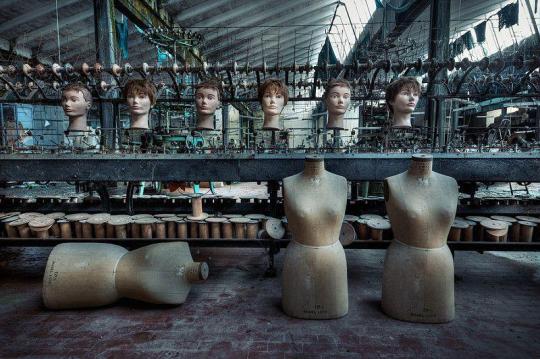
A person’s decision to wear makeup, not wear makeup, or augment their body is their business, because those are decisions they make for their own personal survival. Do not blame them for wanting to survive. Consider the bombardment of messages we hear daily about “worth”. What our bodies look like determine too much to be listed here, but for many, it’s the difference between life and death, even if that’s not an immediately conscious motivation.
Marinate in that.
So let’s get down to the series conclusion. This is an exciting, though brief, one for me:
Performance and Makeup
When my friend Aepril (from blog #1) messaged me about her dilemma of being asked to show her “real” face, we both connected over the uniqueness of the application of makeup as performers. For a performer, makeup goes beyond wearing a nice face out in the world while we conduct our business. Makeup becomes a ritual act, and a space of channeling energy required to suspend disbelief and transport an audience to other times, realms and worlds.
Makeup for performers is also practical: don’t get drowned out by bright stage lights, and accentuate features so that the audience can follow your expressions while you’re telling a story.
One of my favorite parts of performing is, honestly, the pre-show ritual. I love the act of transformation. I go from my blank little pasty potato face and limp baby hair to creatures and characters from my dreams. I can be:
Super femme
Super butch
Superhero
Child
Old man/woman
Dragon
Cat
Spy
Femme fatale
Ballerina
Goddess
Bird
Elemental
Victorian socialite
Bum
Cartoon character
Someone’s dad
Heartthrob
Potted plant
And the list goes on…
Important note: I recognize that my age, whiteness, and stature grant me certain privileges of transformation that not all are afforded. I think this is important to acknowledge, as well as participate in conversations around greater equity in the entertainment industry. Except in cases such as blackface or cultural appropriation, it’s important to challenge type casting and beliefs around the limitations of who can play certain roles.
Makeup allows me to embody the energy I want to convey. If I can look like it, I can believe it. Sit backstage and watch performers after they’ve put on their makeup and costumes. Often, it’s as if their “normal” personality has left the building, and they begin taking on traits and mannerisms of the character they’re playing. It’s a wild experimentation in the realm of the human psyche- peering into our layers and depths of possibilities and dormant desires and aspects of ourselves. Some performers will reference a character they play and say, “yeah, that’s not who I am. But understanding that character gave me greater compassion for people like that”, while others will tell you that their character is a portrayal of their truest selves.
Because of the perceived separation from reality (though art imitates life), the stage is often the safest place for artists to fully show themselves. There is always the option to retreat afterwards and say “oh no, that wasn’t me. It was all pretend.” Or conversely, moments on stage can empower the artist to be supported in their moment of authenticity, because the audience understands that their role is to respectfully hold space and witness. I find that audiences are far better at allowing for differences when the context of being confronted by them is in an environment separate from their daily lives.
Plainly said-- everyone loves a loose cannon or bold personna on stage or in the movies. They feel far more threatened by it in the workplace or in their beds.
I’m neither advocating for, nor dismissing acceptance of all personality types. But I also sometimes find myself in a producer/manager stress space of saying, “yes, I get that this is wicked cute on stage or in the movies, BUT THIS IS REAL LIFE AND COULD YOU PLEASE ANSWER YOUR EMAILS AND NOT STORE THE KNIVES WITH THE HAIR BRUSHES, THANKS.”
The stage is a place where your desire to give everyone the finger and store the knives with the hair brushes is totally okay. And I think it’s great to have that outlet.
Pro tip: it’s smart to carry bandaids on a film set or backstage at a show.
Makeup gives us the courage to let those pieces out. Sam, looking like Sam, won’t do a lot of stuff. Sam looking like a person, animal or entity she admires (or loathes), will do almost anything. Yes, you can have a field day digging into that psychology, but the fact remains nonetheless.
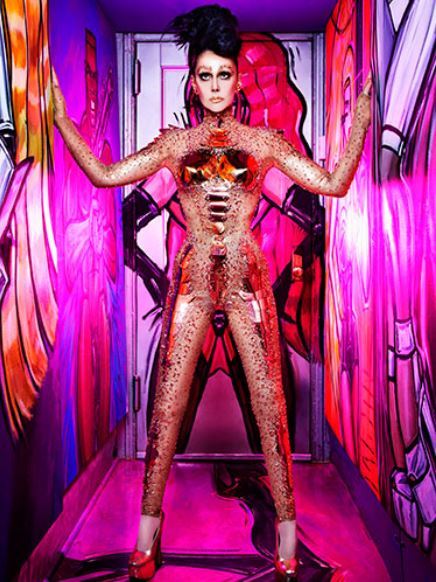
A couple weeks back, beloved Boston burlesque Monster Queen and icon, Devilicia, recommended that I watch “Susanne Bartsch: On Top”, a documentary on Netflix. If you don’t know who this is (I didn’t), here’s an excerpt from her biography on her site:
Susanne Bartsch is New York City’s patron saint of transformation and inclusion. The parties she’s thrown for three decades—from Paris to Tokyo—have provided a venue for countless creative souls and “creatures” to express themselves, come together and forget the hum-drum of the everyday. As Michael Schulman wrote in his 2013 New York Times profile, Susanne’s “empire” continues to flourish “particularly among scene seekers too green to know her history. Wherever Ms. Bartsch goes, the demimonde seems to follow, as if summoned by the bat of her curlicued fake eyelashes.” Fashion mogul John Badum once referred to Susanne as “Mother Teresa in a glitter G-string.”
I can’t recommend this film highly enough. One of the most important parts was when Susanne tells the interviewers that she never had any artistic talent for painting or any other such creative mediums. She instead decided to use her body as her canvas for expression, exploring what makeup, color, texture, and so on could create, and that relation to the world around her. She refers back to the restriction of her upbringing, and how that influences her openness and dedication to personal expression. Susanne influenced countless careers and communities, especially for LGBTQA+ folx and those who consider themselves to be “outsiders”. When people who attend Susanne’s legendary parties were interviewed, many of them speak of these communities as life saving. It was a place where they could just be themselves, and finally be around others who either understood them, or allowed them to be exactly who they are. All of this through the power and creativity of makeup and fashion.
Makeup serves infinite purposes-- safety, transformation, personal exploration, etc. But one thing I love about this craft is its ability to amplify visibility as a sort of flag for finding your people. Often when I’m in a new city, I find myself dressing in a way that will signal to others who might share similar lifestyles that I’m out and available for connection. When I’m at my incognito cafe job and a womxn with black stiletto nails comes up to the register, I’ll give her a certain acknowledging smile and say “I love your nails”, which really means “I see you, friend.” The same way a lonely gay man will show up to one of Susanne’s events with mirror glitter on his eyelids and a tutu made of eyeballs thinking, “hello, do you see me? I’d love to be a part of this family”, so many of us will walk around the world looking for signs of matching lipstick, hairstyle, eyeliner, and tattoos in hopes that we will find other aliens who might accept and understand us.
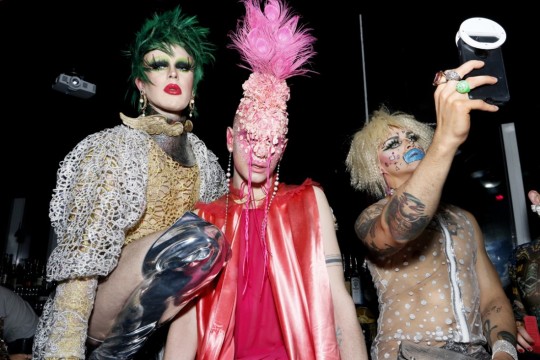
Photo by Cheryl Gorski
Some people find community through the act of not wearing makeup. Yes, I use the word “act” intentionally, because in today’s society, I believe it is a conscious decision to not wear makeup, just as much as it’s a conscious decision to apply makeup. But from personal experience, the people I most often attract when I’m not wearing makeup are not usually “my people”. I give off a very different impression when I wear muted tones, a floppy messy pixie cut, and display my thin, pale, generically-European facial features. When I outwardly express myself through makeup and fashion, it’s like throwing a direct line to the crowds and conversations I want to be having. It’s not a flawless system, of course. Sometimes the same people who love and adore me while I’m dolled up have absolutely no use for me in muggle form, not always realizing that I’m the same person. Sometimes that makes me laugh, sometimes it makes me cry. Depends on the day.
I stand by the belief that your decision to wear or not wear makeup is revolutionary. It is a decision made that acts as agency in how you want your life to be played out. That’s powerful, whether for better or for worse. So many people say “ehhh wearing makeup is conforming” or vice versa. But I’d like to present the challenge that what we do to our own bodies is not the conformity, but rather the conformity lies in the pressure we put on others to think, feel, and present as we do, or in a way that’s convenient and pleasurable to us.
If you did the exercise from the first blog in this series and kept your list of all the reasons why you do and don’t wear makeup, go ahead and look at it now. Reflect on each of those responses, and remember that it’s your fucking life. Our bodies dictate almost all of the experiences we will have in the world. It is your right to try and have as much say in that as possible.
Thank you so much for reading, and best of luck on your journeys of exploration, expression, and finding a home with your people, whoever they may be.
** “women and cis-women” is a term my friend Alexis recently said to me, and I’m playing around with it.
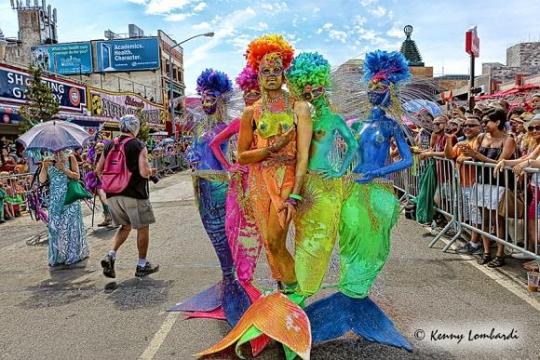
0 notes
Text
Mute Court: Trump’s Precedential Twits
As far as I know, I’m not blocked by @RealDonaldTrump on twitter. But then, I don’t follow him because his twits aren’t of any real interest to me, and I find his communications painful to read. If there’s anything I should know about, it will be strewn across the media, and I will regret reading them.
Others, apparently, desperately want to see Trump’s twits but they can’t because they’ve been blocked. They could always see them in incognito mode, but that’s not good enough and they don’t believe they should have to right click to see what the president twits. I suspect they always demand the right to “seek redress” by responding with their own special expression of vitriol.
Can a president block people on the twitters? When Jameel Jaffer’s first suit from the newly instituted Knight First Amendment Institute at Columbia University, it was disappointing. With so many First Amendment problems swirling around, being blocked from the president’s twits was unserious. It was a novel issue, and sexy at the time suit was filed, but trivial. And complicated. I suspect Trump might have muted these offending twitterers rather than blocked them had he better understood the mechanics of twitter, but block he did, and sue Jaffer did.
Argument was had on the issue before SDNY Judge Naomi Reice Buchwald, where questions were posed as to the proper analogy of twitter to something less unserious.
She asked whether Twitter was different from a public town hall, where government officials would be unable to pull the plug from a microphone to mute speakers with unwelcome views.
“Once it is a public forum, you can’t shut somebody up because you don’t like what they’re saying,” Buchwald said.
Baer said the appropriate analogy was not a town hall, but rather Trump choosing to walk away from someone at a public event.
Assuming twitter to be a public forum is itself problematic. Twitter can suspend or terminate a user at will, as it’s a private enterprise and subject to no public carrier limitations. But then, if you’re not tossed off arbitrarily by twitter, then it has many of the indicia of the public square, where a few million random people can read and respond to each others cat pics and expressions of idiocy at will.
At the outset, there was a question of whether Trump’s use of twitter was as a private individual or as president. He solved that problem by using twitter to make official announcements of public policy and “speak” in his official capacity as president. Presidents can’t block Americans from learning what they’re saying and doing. But does that mean they can’t be blocked on twitter? New technology raises new questions.
Whether the act of blocking rises to a constitutional violation is the novelty of the case — in the law, it’s what’s known as a question of first impression, an issue no other court has decided before. That means there’s real pressure on the judge to get it right the first time. And with a tweeting president who is known for berating magistrates and getting his ardent supporters to dox them if they don’t rule in his favor, even more so.
Judge Buchwald gave it her best effort to get the parties to settle the suit rather than put her in the position of ruling.
The pressure was evident when Buchwald seemed to nudge the parties, in open court, to consider reaching a settlement behind the scenes. “You don’t necessarily want to risk law being made,” she said.
But, of course, both parties want exactly that, to make new law. For the Knight Institute, it would put them on the map to win against Trump. And for Trump, it would prove he’s not the blithering dolt everyone knows him to be.
There remains a genuine question of law — in the travel-ban controversy in particular, which the Supreme Court will settle soon — about whether his campaign promises and anti-Muslim tweets as a candidate can be imputed to later, official government acts. But as a public servant, no one really doubts that Trump’s tweets are a public concern, in more ways than one: They establish government policy, inform the citizenry about administration priorities, announce personnel changes, are a means of diplomacy, move financial markets, and, if Trump happens to be in a foul mood, could spark some global catastrophe.
While all of this is accurate, the implications of ruling that a president cannot block people on the twitters carries further implications as well. Can people be turned away from an event in a public forum because there is no room? What if they’re uninvited, or dressed “inappropriately,” according to whoever decides such things? Can they be removed for screaming obscenities at the president during a speech?
They may be entitled to know of the president’s public pronouncements, but are they entitled to any particular forum to learn of them? Is it their burden to wait until they appear in the funny pages or go incognito, or Trump’s burden to mute them instead of block them? Must Trump suffer his mentions replete with twits saying words that would hurt his delicate feelings?
Trump’s Twitter use draws intense interest for his unvarnished commentary, including attacks on critics. His tweets often shape news.
Katherine Fallow, a lawyer for the plaintiffs, told Buchwald the record “shows unambiguously that the president operates his account in an official capacity.”
Baer acknowledged that Trump sometimes uses his Twitter account to announce policy, but said that blocking users was not an official action.
Obviously, muting instead of blocking would resolve the problem for all. But the Baer raised one additional argument, that separation of powers precludes the court from ordering the president to do so.
Baer also argued that the court cannot order the president to unblock users, because of his position as head of another branch of government.
Marbury v. Madison may cover that question. As Cristian Farias noted at the top of his New York Magazine post, taxpayer money is funding Trump’s defense of his right to block.
For nearly two hours on Thursday, we the taxpayers funded the government’s defense, in a federal courtroom in Manhattan, of Donald Trump’s unbridled use of his Twitter account. On our dime, the Department of Justice dispatched three lawyers to tell a judge, more or less, that courts have no power to tell the president what to do with @realDonaldTrump — let alone to declare that the First Amendment imposes an obligation on him to unblock users who have been critical of him or his administration.
As trivial an issue as this may have been for the Knight Institute to take on, it’s far worse that government lawyers are dispatched to fight something so inane. Then again, petty minds create petty problems, and even petty people are entitled to have their petty rights protected.
Judge Buchwald will eventually hold that Trump’s use of twitter is an official presidential act, not because of twitter but because of the manner in which he uses it. And as such, he can’t block Americans from viewing his official public pronouncements in whatever medium they’re made provided it’s an open medium. So if he doesn’t want to see their mean twits, he can mute them, but he can’t block them from seeing his.
And if Trump doesn’t like it, he can just stop twitting, for which we would all be thankful.
Copyright © 2007-2018 Simple Justice NY, LLC This feed is for personal, non-commercial and Newstex use only. The use of this feed anywhere else violates copyright. If this content is not in your news reader, it means the page you are viewing infringes copyright. (Digital Fingerprint: 51981395c77d7762065ca2c084b63e47) Mute Court: Trump’s Precedential Twits republished via Simple Justice
0 notes